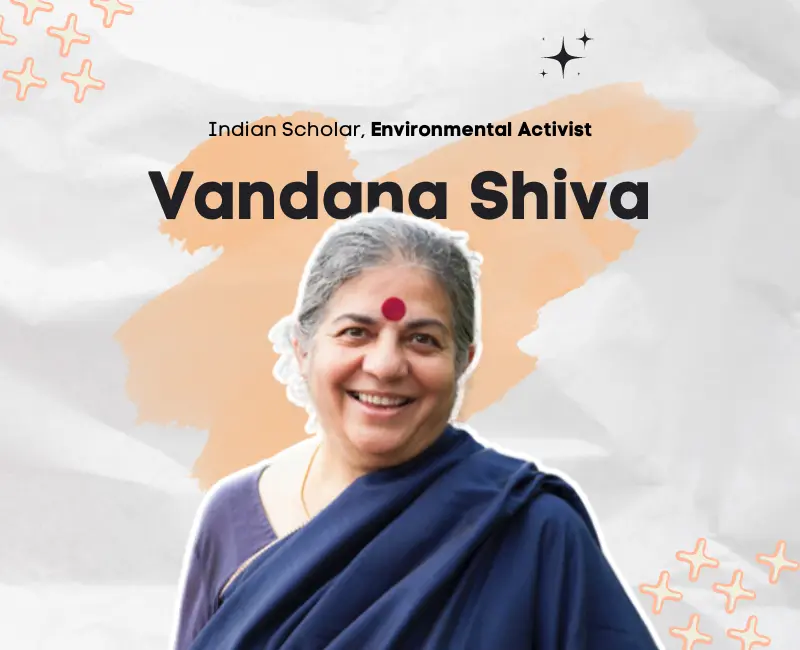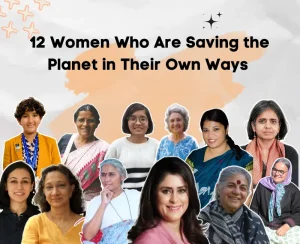Exploring the Legacy of Vandana Shiva: Indian Scholar and Environmental Advocate

Vandana Shiva is synonymous with environmental activism, food sovereignty, and a relentless fight for a more sustainable future. She’s not your average scholar; she’s a warrior, a philosopher-scientist who challenges the status quo and inspires millions with her unwavering commitment to protecting our planet.
Shiva is based in Delhi and has written over 20 books. She is known as the “Gandhi of grain” because she participates in the anti-GMO movement.
Shiva is a head and board member of the International Forum on Globalization (with Ralph Nader, Jerry Mander, and Helena Norberg-Hodge) and an anti-globalization activist. She has argued in favour of many ancient practices, as seen by her interview in the book Vedic Ecology (by Ranchor Prime). She serves on the scientific committee of Fundacion IDEAS, a think tank affiliated with Spain’s Socialist Party. She is also a member of the International Organization for Participatory Societies.
This article explores Vandana Shiva’s inspiring journey from scientist to prominent environmental and social justice advocate.
A Glimpse into Early Life and Education
Vandana Shiva, born on November 5, 1952, in Dehra Dun, India, was raised amidst the serene beauty of the Himalayan foothills. Her upbringing was shaped by her father’s role as a forestry official, and her mother was a farmer with a love for nature.
Her family’s agricultural background instilled a deep connection to nature and a keen awareness of environmental issues from an early age.
Shiva studied physics at Punjab University at Chandigarh, earning a Bachelor of Science in 1972.
Led by her fascination with nature, she spent a brief time at the Bhabha Atomic Research Centre before coming to Canada in 1977 to pursue a master’s degree of science in philosophy at Guelph University. There, she published a thesis titled “Changes in the concept of periodicity of light.”
This scientific grounding informs her approach to environmental issues, allowing her to analyse and critically challenge the techno-fixes often proposed by corporations.
She finished and obtained her PhD in philosophy from Western Ontario University in 1978, focusing on the philosophy of physics. Her dissertation, “Hidden Variables and Locality in Quantum Theory,” examined the mathematical and philosophical ramifications of hidden variable theories that lie outside the scope of Bell’s theorem.
She eventually conducted multidisciplinary science, technology, and environmental policy research at the Indian Institute of Science and Management in Bangalore.
Shiva’s Environmental Awakening
Shiva became interested in environmentalism after returning home and seeing that a favorite childhood forest had been removed and a stream emptied to make way for an apple orchard. Shiva returned to India after completing her degrees to work for the Indian Institute of Science and Management.
In 1982, she established RFSTN, renamed the Research Foundation for Science, Technology, and Ecology (RFSTE), in her mother’s cowshed in Dehra Dun.
Shiva focused on grassroots initiatives to stop clear-cut logging and the development of major dams. She was best recognized, however, as a critic of Asia’s Green Revolution, an international initiative launched in the 1960s to enhance food production in developing countries by using higher-yielding seed stocks and more pesticides and fertilizers.
In 1984, Vandana Shiva began her activism in agriculture after witnessing the violence in Punjab and the Bhopal disaster caused by Union Carbide’s pesticide plant. Her research for UN University resulted in her book, “The Violence of the Green Revolution.”
Shiva contends that the seed-chemical approach promoted by the green revolution has harmed soil fertility and ecosystems. She highlights data suggesting over 1400 pesticides worldwide may contaminate food.
As a founding member of the World Future Council (WFC), Shiva advocates for policies benefiting future generations, with a focus on climate security.
Shiva supports the inclusion of ecocide as a crime in the International Criminal Court, arguing that the pursuit of endless growth is causing irreparable harm to the Earth and its ecosystems.
She argued that the Green Revolution had resulted in pollution, a loss of indigenous seed diversity and traditional agricultural knowledge, and a worrying reliance on expensive chemicals by impoverished farmers.
In response, RFSTE scientists developed seed banks across India to conserve agricultural heritage and train farmers in sustainable farming methods.
Navdanya: A Seed of Change
Shiva launched Navdanya 1991, translating to “Nine Seeds” or “New Gift” in Hindi. The project, part of RFSTE, sought to resist the growing trend toward monoculture supported by huge businesses.
Navdanya established over 40 seed banks in India, attempting to educate farmers about the benefits of preserving their distinct strains of seed crops. Shiva maintained that homogenizing grain production was risky due to climate change.
Unlike local seed strains, which evolved over time and thus adapted to the environment of a specific place, seed strains promoted by huge businesses necessitated extensive amounts of fertilizer and pesticides.
Furthermore, many of these seed strains were genetically altered and copyrighted, preventing farmers from conserving seeds from previous harvests to sow the following season and forcing them to buy new seeds yearly.
Shiva believed that a decentralized approach to agriculture, based on a varied range of regionally adapted seeds, would be more resilient to the vagaries of a changing environment than a system reliant on only a few kinds.
She expected the danger of the World Trade Organization’s (WTO) Trade-Related Intellectual Property Rights (TRIPS) Agreement, which permitted the patenting of life forms and thus allowed corporations to essentially require farmers to continue purchasing their seeds after eliminating local varieties.
She spoke out against the accord during the 1999 WTO demonstrations in Seattle. The previous year, Shiva established Diverse Women for Diversity, an international equivalent of Navdanya.
In 2001, she established Bija Vidyapeeth, a school and organic farm near Dehra Dun that offers month-long sustainable living and agriculture courses.
A Fight for Social and Ecological Justice
Shiva’s work goes well beyond seed banks. She is an outspoken opponent of globalization and its negative effects on the environment and local communities. She opposes the dominance of transnational companies, especially in agriculture, and she promotes fair trade policies that uplift farmers and safeguard ecosystems.
Another essential facet of her activism is the work she does against biopiracy. Biopiracy describes how companies’ appropriate genetic resources from poor nations without providing just compensation or honouring indigenous knowledge. Shiva opposes this exploitation, ensuring the local people profit from their biodiversity.
Advocacy Against Biopiracy
Shiva has been a vocal critic of global corporations appropriating biological wealth from poorer countries without consent or fair profit-sharing. Shiva’s 1997 book Biopiracy: The Plunder of Nature and Knowledge strongly condemns these practices as equivalent to biological theft.
In subsequent works such as “Stolen Harvest: The Hijacking of the Global Food Supply” (1999), “Tomorrow’s Biodiversity” (2000), and “Patents: Myths and Reality” (2001), Shiva delves into topics like corporate trade agreements, the decline in crop genetic diversity, and patent law, highlighting the negative impacts of corporate dominance.
“Water Wars: Privatization, Pollution, and Profit” (2002) critiques corporations’ attempts to privatize water resources. Shiva continues to articulate the problems stemming from corporate control and advocate for realistic solutions in works like “Globalization’s New Wars: Seed, Water, and Life Forms” (2005) and “Earth Democracy: Justice, Sustainability, and Peace” (2005). She has also edited collections such as “Manifestos on the Future of Food and Seed” (2007).
Ecofeminism
Vandana Shiva is a prominent figure in the global ecofeminist movement, advocating for a more sustainable and inclusive approach to agriculture that centers on women’s involvement. In her 2004 article “Empowering Women,” she argues that reinstating farming systems in India focusing on women would lead to greater sustainability and productivity, challenging the patriarchal exclusion prevalent in current agricultural practices.
Shiva contends that women bear the brunt of ecological destruction and industrial disasters, highlighting the need for a shift in focus towards empowering them in agricultural processes.
However, some critics, like Cecile Jackson, have raised concerns about Shiva’s views, labelling them essentialist.
In 1993, Shiva co-authored the book Ecofeminism with Maria Mies. The book combines Western and Southern feminist perspectives with environmental and technological issues under the umbrella of ecofeminism. While the book presents thought-provoking essays, critics like Stefanie Lay note a need for new ecofeminist theories and contemporary analysis and a failure to acknowledge the work of others.
Criticism and controversy
Vandana Shiva has faced criticism and controversy regarding her views on GMOs and activism methods. In an article titled “Seeds of Doubt” by Michael Specter in The New Yorker, concerns were raised about her absolutism regarding GMOs and allegations regarding the US’s aid to India after a cyclone. Shiva responded by claiming she’s been targeted due to her activism against Monsanto.
Additionally, cases of plagiarism have been pointed out against Shiva, including instances where she copied verbatim from other sources. Journalist Keith Kloor highlighted Shiva’s high lecture fees and lifestyle compared to her portrayal as a champion of people with low incomes.
Stewart Brand criticized Shiva’s statements as pseudo-scientific, particularly regarding “heritable sterility.” He also questioned her opposition to GMOs, citing instances where Indian farmers illegally planted GM crops due to increased yield and lower pesticide usage.
Despite Shiva’s efforts, laws restricting GMOs in India led to grassroots movements like the Shetkari Sanghatana, advocating for reform. As of 2020, approximately 25% of cotton farmed in India is genetically modified.
In short
Vandana Shiva is deeply involved in agriculture, biodiversity, and intellectual property rights activism. In 1982, Shiva founded the Research Foundation for Science, Technology, and Ecology and Navdanya in 1991 to promote organic farming and protect native seeds. Navdanya has set up over 40 seed banks across India. In 2004, she started Bija Vidyapeeth, a college for sustainable living.
Shiva has challenged the biopiracy of resources like neem, basmati, and wheat and advised governments on biodiversity and intellectual property legislation. In 1993, she got the Right Livelihood Award for her work.
Her book “Making Peace With the Earth” discusses biodiversity and community-nature relationships. She emphasizes the importance of traditional knowledge in understanding nature.
Shiva has advised governments and NGOs globally, including the International Forum on Globalization and the Third World Network. She heads the Commission on the Future of Food in Tuscany, Italy, and serves on various committees in India.
In 2021, she advised Sri Lanka to ban inorganic fertilizers and pesticides to boost farmer prosperity and soil fertility. However, the sudden ban led to a farming crisis, particularly affecting the tea and rice industries. The ban was later overturned after seven months.
Vandana Shiva shows us the power of one voice for change. Let’s follow her lead and work towards a world where people and nature coexist.


